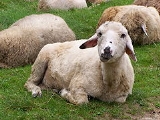
Pesach Sheni
Encyclopedia
Pesach Sheni occurs every year one month after the well known holiday of Passover
. The purpose of this day is for those who could otherwise not give the Passover sacrifice either because they were impure or to far from Jerusalem, to give the festive sacrifice at a different datel The holiday is mentioned in the Torah
in of which the following text is a paraphrase.
A year after the Exodus, G-d instructed the people of Israel to bring the Passover offering on the afternoon of the fourteenth of Nissan, and to eat it that evening, roasted over the fire, together with matzah and bitter herbs, as they had done on the previous year just before they left Egypt. "There were, however, certain persons who had become ritually impure through contact with a dead body, and could not, therefore, prepare the Passover offering on that day. They approached Moses and Aaron...and they said: '...Why should we be deprived, and not be able to present G-d's offering in its time, amongst the children of Israel?'" (Numbers 9).
In response to their plea, G-d established the 14th of Iyar as a "Second Passover" (Pesach Sheini) for anyone who was unable to bring the offering on its appointed time in the previous month. The day thus represents the "second chance" achieved by teshuvah, the power of repentance and "return."
In modern times, after the destruction of the Temple in Jerusalem
and because of lack of access to the Temple Mount
, Jews are unable to perform the Passover sacrifice, either on Passover or on Pesach Sheni. Some have the custom (minhag
) to eat matzah during Pesach Sheni in memory of the Korban Pesach
.
In Chassidic philosophy, especially as expounded upon by Rabbi Yosef Yitzchok Schneersohn, Pesach Sheni is about second chances, since the original Pesach Sheni was in response to people who had been unable to be included in the Pesach observance and were granted another opportunity exactly one full moon after the first Pesach.
Passover
Passover is a Jewish holiday and festival. It commemorates the story of the Exodus, in which the ancient Israelites were freed from slavery in Egypt...
. The purpose of this day is for those who could otherwise not give the Passover sacrifice either because they were impure or to far from Jerusalem, to give the festive sacrifice at a different datel The holiday is mentioned in the Torah
Torah
Torah- A scroll containing the first five books of the BibleThe Torah , is name given by Jews to the first five books of the bible—Genesis , Exodus , Leviticus , Numbers and Deuteronomy Torah- A scroll containing the first five books of the BibleThe Torah , is name given by Jews to the first five...
in of which the following text is a paraphrase.
A year after the Exodus, G-d instructed the people of Israel to bring the Passover offering on the afternoon of the fourteenth of Nissan, and to eat it that evening, roasted over the fire, together with matzah and bitter herbs, as they had done on the previous year just before they left Egypt. "There were, however, certain persons who had become ritually impure through contact with a dead body, and could not, therefore, prepare the Passover offering on that day. They approached Moses and Aaron...and they said: '...Why should we be deprived, and not be able to present G-d's offering in its time, amongst the children of Israel?'" (Numbers 9).
In response to their plea, G-d established the 14th of Iyar as a "Second Passover" (Pesach Sheini) for anyone who was unable to bring the offering on its appointed time in the previous month. The day thus represents the "second chance" achieved by teshuvah, the power of repentance and "return."
In modern times, after the destruction of the Temple in Jerusalem
Temple in Jerusalem
The Temple in Jerusalem or Holy Temple , refers to one of a series of structures which were historically located on the Temple Mount in the Old City of Jerusalem, the current site of the Dome of the Rock. Historically, these successive temples stood at this location and functioned as the centre of...
and because of lack of access to the Temple Mount
Temple Mount
The Temple Mount, known in Hebrew as , and in Arabic as the Haram Ash-Sharif , is one of the most important religious sites in the Old City of Jerusalem. It has been used as a religious site for thousands of years...
, Jews are unable to perform the Passover sacrifice, either on Passover or on Pesach Sheni. Some have the custom (minhag
Minhag
Minhag is an accepted tradition or group of traditions in Judaism. A related concept, Nusach , refers to the traditional order and form of the prayers...
) to eat matzah during Pesach Sheni in memory of the Korban Pesach
Korban Pesach
The Passover sacrifice , also known as the "sacrifice of Passover", the "Paschal Lamb" is the sacrifice that the Torah mandates to be brought on the eve of Passover, and eaten on the first night of the holiday with bitter herbs and matzo. According to the Torah, it was first offered on the night of...
.
In Chassidic philosophy, especially as expounded upon by Rabbi Yosef Yitzchok Schneersohn, Pesach Sheni is about second chances, since the original Pesach Sheni was in response to people who had been unable to be included in the Pesach observance and were granted another opportunity exactly one full moon after the first Pesach.

